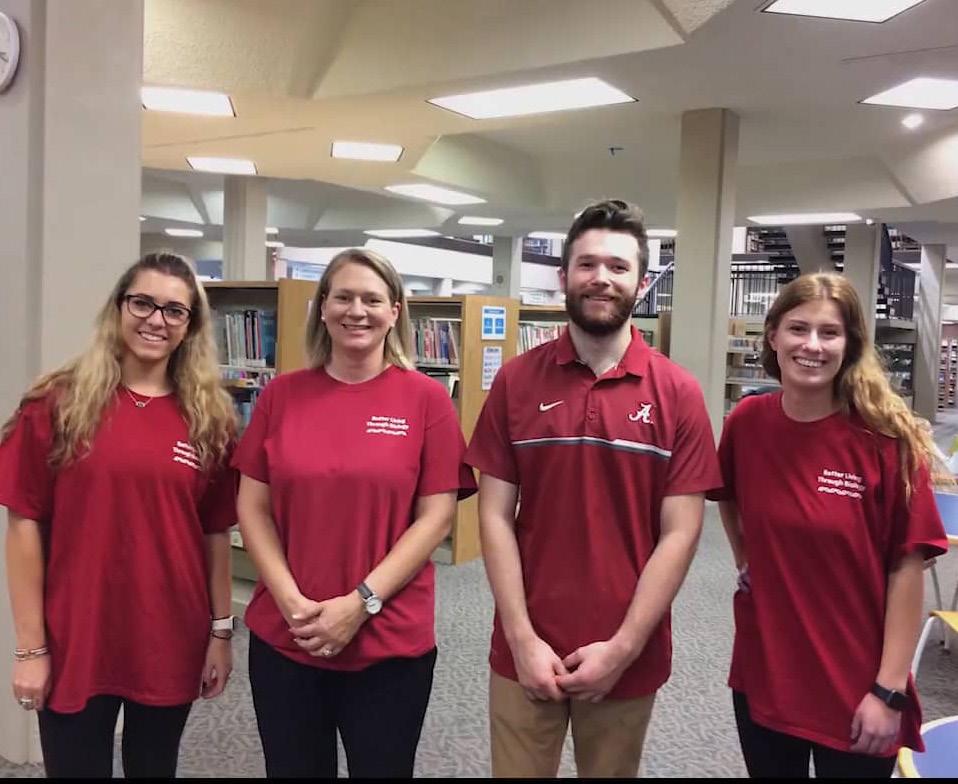
4 minute read
Training the Next Gen; Biology Outreach
TRAINING THE NEXT GENERATION OF BIOLOGISTS
As the biological sciences continue to expand in research depth, there is a need for highly trained individuals to fill the workforce. The field of Macrosystems Biology—the regional-to-continental scale study of ecosystems—is one of these blossoming areas in biology. The National Science Foundation has invested in the development, building, and operation of The National Ecological Observatory Network (NEON) as a means of studying long-term changes in ecosystems across the US on a macrosystems scale. The NEON program is the largest ecological observatory network in the U.S. with field sites spanning the country, from Puerto Rico to Alaska to Hawaii. The program will collect ecological data from terrestrial and aquatic field sites in 20 North American ecoclimate domains for 30 years. Each of these domains, along with the project’s central facility, is staffed with numerous biologists with research backgrounds spanning the fields of entomology, disease ecology, biogeochemical cycling, and animal population dynamics, to name a few. The NEON program is the first life-science project to be constructed solely with National Science Foundation (NSF) Major Research Equipment and Facilities Construction (MREFC) funding. This type of funding has historically been reserved for national or international projects, such as space telescopes and particle accelerators, that advance the boundaries of science and engineering and generate data and resources to support the work of hundreds or thousands of researchers over several decades.
Since NEON’s inception, faculty members from our department have been involved in the development and design of the project. This has included developing several of the central themes for the project, aiding in site selection, and testing new ecological equipment to be used during the project. Now that the project is operational, our faculty have trained several undergraduate and graduate students, along with postdoctoral scientists, who have transitioned into permanent research and technical positions with NEON. Currently, there are 10 former UA BSC students working for NEON in various capacities, from field technicians to domain managers. Specifically, Dr. Rajit Patankar, a former postdoctoral scientist in the department, is now the field operation manager for NEON domain 11 in Denton, TX. Jamie Galloway, a 2014 graduate of the department, remains in Tuscaloosa and serves as a senior field ecologist in the Ozark Complex. Additionally, Dr. Stephanie Parker, who received her PhD in the department in 2008, is an aquatic ecologist working in the Aquatic Observation System team at the NEON head office in Boulder, CO. Our department is proud of the strong relationship we have developed with NEON and will continue to enhance our education programs, which will enable our graduates to compete for new positions with NEON and other research organization as big data science continues to expand across the globe. ■
COVID-19 Pandemic. A video explaining the outreach program can be found at the following link: https://vimeo. com/419964951.
“The 14 UA biology majors did such an outstanding job creating and teaching the ‘Zoom’ hands-on lessons to these K-12 students,” said Yates. Student participants included the Boys & Girls Clubs of West Alabama, Girl Scouts of North-Central Alabama, Children’s Hands-on Museum (CHOM) members, and UA Arboretum members. Supplies were delivered by Amazon to the UA students’ homes and to the Boys & Girls Clubs of West Alabama students, while supply lists were made known on the CHOM and UA Arboretum websites so that parents could buy those supplies. The UA students taught the lessons and performed the hands-on experiments in real-time Zoom sessions, along with making teaching videos. Some of the exciting topics featured included edible DNA, zoology, microscopes, and plant biology. ■
BIOLOGY OUTREACH
University of Alabama instructor Jeanna Yates leads a summer outreach program to raise awareness of environmental issues and provide a strong science foundation to local K-12 students through hands-on science experiments. With a goal of increasing the love of science in local K-12 students, this program, founded in 2008, originally served 135 students and now typically serves over 1000 students annually. These efforts help keep kids active and engaged in educational activities, while bringing those activities out of the classroom and into a more interactive environment. Studies show that providing young children a strong science foundation results in higher achievement in middle and high school, and provides them with more career opportunities in science and technology fields.
Prior to the pandemic the program had already garnished recognition, receiving The University of Alabama Council on Community-Based Partnerships Excellence in Community Affairs Award for Outstanding Faculty/Staff-Initiated Engagement Effort. However, the program took on new challenges, as well as importance, in 2020 with the COVID-19 pandemic. This necessitated creativity on the part of the coordinators and UA student leaders, as well as the K-12 student participants. The University of Alabama biology majors taught hands-on STEM lessons virtually to children of essential workers using Zoom during the










